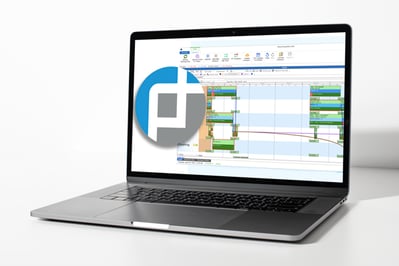The Power of Real-Time Inventory Tracking Systems
With the rise of globalization, increasing customer demands, and competitive pressures, manufacturers are constantly seeking innovative solutions to streamline their processes and stay ahead of the curve. One area where significant improvements can be made is in inventory management.
Traditional methods of inventory tracking often fall short in meeting the demands of modern manufacturing, leading to inefficiencies, stockouts, and excess inventory. However, with the advent of real-time inventory tracking systems, manufacturers now have the tools to revolutionize their operations and drive sustainable growth.
In this blog post, we'll explore the transformative potential of real-time inventory tracking systems in industrial manufacturing. We'll look into the benefits they offer, the challenges they address, and the crucial role they play in integrating with existing Manufacturing Execution Systems (MES), Enterprise Resource Planning (ERP), and Supply Chain Management (SCM) systems, with a specific focus on the integration between PlanetTogether and leading ERP providers like SAP, Oracle, Microsoft, Kinaxis, Aveva, and others.

Real-Time Inventory Tracking Systems
Real-time inventory tracking systems utilize advanced technologies such as Internet of Things (IoT), RFID (Radio-Frequency Identification), barcode scanning, and cloud computing to provide up-to-the-minute visibility into inventory levels, locations, and movements throughout the manufacturing process. Unlike traditional inventory management methods that rely on manual data entry and periodic stock counts, real-time systems capture data automatically and update inventory records instantaneously, enabling manufacturers to make informed decisions in real-time.
Benefits of Real-Time Inventory Tracking Systems
Enhanced Accuracy and Visibility: Real-time inventory tracking systems eliminate the need for manual data entry, reducing the risk of human errors and inaccuracies. By providing real-time visibility into inventory levels across multiple locations and production stages, manufacturers can make more accurate demand forecasts, prevent stockouts, and optimize inventory levels.
Improved Efficiency and Productivity: With real-time inventory data at their fingertips, manufacturing teams can streamline material handling processes, reduce search times, and minimize production delays. By automating inventory replenishment and order management tasks, manufacturers can optimize resource allocation, minimize waste, and maximize productivity.
Better Inventory Control and Cost Savings: Real-time inventory tracking systems enable manufacturers to implement Just-in-Time (JIT) inventory management practices, reducing excess inventory holding costs and improving cash flow. By monitoring inventory levels in real-time and setting automatic reorder triggers, manufacturers can avoid stockouts and costly rush orders while minimizing excess inventory carrying costs.
Seamless Integration with ERP, SCM, and MES Systems: One of the key strengths of real-time inventory tracking systems lies in their ability to integrate seamlessly with existing ERP, SCM, and MES systems. By connecting inventory data with production schedules, order management systems, and procurement processes, manufacturers can achieve end-to-end visibility and control over their entire supply chain.

Integration with PlanetTogether and Leading ERP Providers
PlanetTogether is a leading provider of advanced planning and scheduling software for manufacturers. Their solution offers powerful capabilities for optimizing production schedules, managing resources, and balancing production constraints. To harness the full potential of real-time inventory tracking systems, it's essential to integrate PlanetTogether with leading ERP providers such as SAP, Oracle, Microsoft Dynamics, Kinaxis RapidResponse, Aveva Manufacturing Execution System, and others.
Integration between PlanetTogether and ERP systems enables manufacturers to:
- Sync production schedules with inventory levels to ensure optimal resource utilization and minimize stockouts.
- Automate order creation and fulfillment processes based on real-time inventory data and production capacity.
- Generate accurate demand forecasts and procurement plans by combining production schedules with sales and inventory data.
- Track work-in-progress (WIP) inventory across multiple production stages and monitor production performance in real-time.
- Streamline communication and collaboration between production, procurement, and inventory management teams.
Best Practices for Successful Integration
While integrating PlanetTogether with ERP, SCM, and MES systems can unlock significant benefits, it's important to follow best practices to ensure a smooth implementation process:
- Define clear integration objectives and requirements based on the unique needs and goals of your manufacturing operations.
- Collaborate closely with IT and operations teams to map out data flows, identify integration points, and establish data synchronization protocols.
- Leverage pre-built connectors, APIs (Application Programming Interfaces), and middleware platforms to simplify integration tasks and minimize custom development efforts.
- Conduct thorough testing and validation to verify data accuracy, system performance, and end-to-end process flows before deploying the integrated solution in a production environment.
- Provide comprehensive training and support to end-users to ensure adoption and maximize the benefits of the integrated system.
Real-time inventory tracking systems hold immense potential for transforming manufacturing operations and driving sustainable growth. By providing accurate visibility into inventory levels, locations, and movements in real-time, these systems empower manufacturers to optimize resource allocation, minimize waste, and enhance customer satisfaction.
Integration between PlanetTogether and leading ERP providers such as SAP, Oracle, Microsoft Dynamics, Kinaxis RapidResponse, Aveva, and others is essential for achieving seamless end-to-end visibility and control over the entire supply chain. By following best practices for integration, manufacturers can unlock the full potential of real-time inventory tracking systems and gain a competitive edge in today's dynamic marketplace.
Real-time inventory tracking systems represent a strategic investment that can yield substantial returns in terms of efficiency, productivity, and profitability. By harnessing the power of real-time data insights, manufacturers can optimize their operations, drive continuous improvement, and thrive in an increasingly competitive global market.
Are you ready to take your manufacturing operations to the next level? Contact us today to learn more about how PlanetTogether can help you achieve your goals and drive success in your industry.
